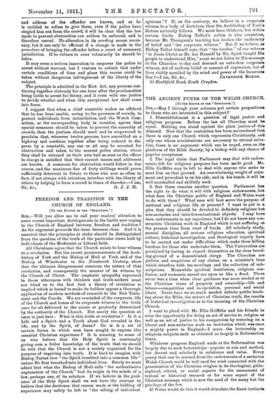WARLIKE PICKETING.
[To THR EDITOR or rag "SPECTATOR."] Sra,—If a section of railway men decide early next month to "withdraw their labour," there is still time for the Govern- ment so to amend existing laws that those who desire to go on working can then no longer be intimidated with impunity.
In a previous letter I have tried to show that the limitation of the number of picketers to two at any one exit and a pro- vision that they must wear conspicuous badges would make it easy for the police to identify them and ensure a conviction if they had committed intimidation. But we have still to deal with the intimidation by crowds.
Any person guilty of a disturbance of the public peace may be apprehended at the time without a warrant, but no words, however quarrelsome or threatening, render the offender liable to arrest, nor does obstruction of the highway. A prosecu- tion by way of summons is only feasible if the name and address of the offender are known, and as he is entitled to refuse to give these, even if the police have singled him out from the crowd, it will be clear that the law made to prevent obstruction can seldom be enforced, and is therefore unreal. No alteration in its wording seems neces- sary, but it can only be efficient if a change is made in the procedure of bringing the offender before a court of summary jurisdiction. If he refuses to come voluntarily he should be taken.
It may seem a serious innovation to empower the police to arrest without warrant, but I venture to submit that under certain conditions of time and place this course could be taken without dangerous infringement of the liberty of the subject.
The principle is admitted in the Riot Act, any persons con- tinuing together riotously for one hour after the proclamation being liable to arrest for felony, and it rests with one justice to decide whether and when this exceptional law shall come into force.
I suggest that when a chief constable makes an affidavit that he has been unable, owing to the presence of crowds, to protect individuals from intimidation, and the Watch Com- mittee, or the corresponding body in counties, agrees that special measures should be taken to prevent the assembly of crowds, then the justices should meet and be empowered to proclaim that, wherever twelve persons have assembled on a highway and continue together after being ordered to dis- perse by a constable, any one or all may be arrested for obstruction and taken to the nearest police station, where they shall be released on their own bail as soon as the officer in charge is satisfied that their correct names and addresses are known. A summons for obstruction would follow in due course, and the maximum fine of forty shillings would prove sufficiently deterrent in future to those who now so often in fact, if not always with intention, interfere with the liberty of others by helping to form a crowd in times of disorder.—I am,



















































 Previous page
Previous page